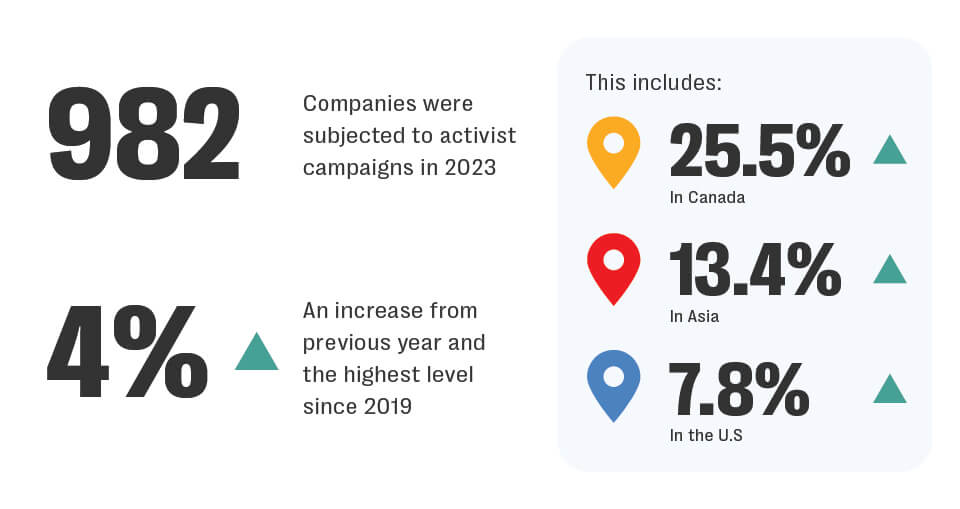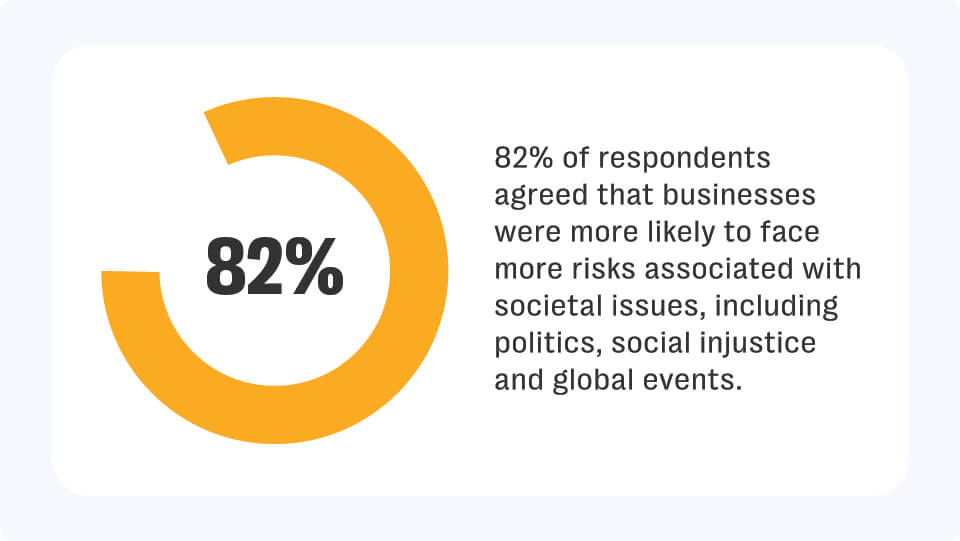Over the previous half decade, a seismic shift has reshaped the foundations of corporate strategy and created a social and cultural justice-driven culture that has brought the tension between a corporation’s purpose and profit into sharp focus.
Modern corporations are increasingly walking a tightrope, balancing the growing demands for political, environmental and social advocacy from employees, investors and consumers against the relentless pressure to deliver shareholder value.
Too often have brands complied only to find themselves locked into a vicious cycle of statement-making and adopting public positions that are at odds with their commercial goals and organizational priorities. Further complicating matters, speaking out on some issues or staying silent on others can cause a ripple effect around a brand or corporations internal and external networks, fuelling discontent and leading to calls for boycotts, resignations or legal challenges that are then broadcast globally across social media.
While many of these shareholder and employee calls for change are legitimate, these perceptions, like those of the wider population, are equally susceptible to being manipulated and shaped by mis-and disinformation and coordinated online campaigns by activist groups or bad actors seeking to exploit the situation for their own personal gain.
How is stakeholder activism impacting corporations?
A survey of the recent data underscores the rising tide of shareholder activism and a recognition of its significant impact on corporate reputation. According to the Shareholder Activism Annual Review of 2024 published by the Harvard Law School Forum on Corporate Governance:
- There has been a sharp increase in the number of US companies identifying shareholder activism as a risk as part of their corporate disclosures. In 2023, 23.4% of Russell 3000 companies disclosed shareholder activism as a risk in their 10-K reporting, up from 21.4% the year before.
- The risk of shareholder activism remains high in several key global markets. In 2023, 982 companies were subject to activist campaigns globally representing a 4% increase from the previous year, and the highest level of campaigns recorded since 2019. This includes a 25.5%, 13.4% and 7.8% increase in the number of brands targeted in campaigns in Canada, Asia and the U.S, respectively.
- The previous year also saw the first increase in the number of activist short campaigns recorded globally for four consecutive years, rising 14.6% from 2022 levels to 110 campaigns.

These statistics highlight the pervasive nature of shareholder activism across diverse markets and regulatory environments alongside a clear recognition of the potentially adverse impact of activist shareholder campaigns on brand operations and reputation.
How does stakeholder activism impact brand value and reputation?
As social media and digital platforms amplify individual voices, the traditional boundaries of shareholder activism are rapidly evolving, presenting new and complex challenges to corporate reputation and operations management. Some of the most consequential impacts of shareholder activism can include:
 Reputational Damage: Negative campaigns can lead to long-lasting harm to brand image and consumer trust.
Reputational Damage: Negative campaigns can lead to long-lasting harm to brand image and consumer trust.
 Operational Disruptions: Addressing activist demands can result in product-recalls or divert significant resources and management attention from core business and corporate social responsibility activities.
Operational Disruptions: Addressing activist demands can result in product-recalls or divert significant resources and management attention from core business and corporate social responsibility activities.
![]() Market Volatility: High-profile activist campaigns can lead to stock price fluctuations and investor uncertainty.
Market Volatility: High-profile activist campaigns can lead to stock price fluctuations and investor uncertainty.
 Talent Retention Challenges: Controversy stemming from activist campaigns may impact employee morale and the company’s ability to attract top talent.
Talent Retention Challenges: Controversy stemming from activist campaigns may impact employee morale and the company’s ability to attract top talent.
How are value based consumers reshaping brand loyalty?
Today’s empowered consumers are more opinionated, proactive, and vocal than ever. The proliferation of digital and social touchpoints lets consumer vocalizations spread like wildfire, often overpowering corporate messaging. A brand crisis or activist-led campaign can easily break consumers’ views regarding commitment to corporate values, damaging brand reputation and worth.
This trend is further reflected in a report on Navigating Stakeholder Expectations published by McKinsey & Company that surveyed nearly 5,000 consumers in the United States and discovered:
- A majority (61% across all generations) of consumers want brands to take action on societal issues. This expectation rises to 76% among younger Millennial and Gen-Z consumers.
- “Brand resonance” or whether “a brand was for someone like me” ranks alongside “product fundamentals” as the largest driver of brand loyalty.
- A majority (62%) of respondents indicated that cultural alignment now exerts the most influence on their purchasing decisions.
Business leaders too are increasingly aware of these risks. According to a recent survey of over 100 C-Suite Executives commissioned by Resolver as part of the Communication Risk Leader Survey 2024, a majority (82%) of respondents agreed that businesses were more likely to face more risks associated with societal issues, including politics, social injustice and global events.

Are employees becoming the new corporate watchdogs?
Alongside activist shareholders, employees are increasingly acting like coordinated watch dogs; willing to call out business when their actions diverge from the public pronouncements or when their actions appear in conflict with their employees core values. This can result in employees taking action against employers using petitions, walkouts, coordinated online campaigns and even leaking embarrassing internal information to hold their employers to account for their perceived lack of social responsibility.
For example, in April 2024, a multinational technology company was forced to lay off more than 50 employees after protests at two offices in the US over the organizations business relations with Israel amidst the ongoing Israel-Hamas conflict. A month later, employees at a popular Gen AI services company leaked confidential communications to media outlets after being angered by their employer’s treatment of departing staff.
Brands can no longer afford to remain complacent in this today’s environment of increased shareholder and employee scrutiny. As Alison Taylor, a clinical associate professor at New York University’s Stern School of Business argues in an article published in the Harvard Business Review “the messy reality is that employee and corporate speech have intersected in uncontained ways that make internal organizational conflict inevitable”.
How Resolver safeguards your brand from shareholder activism
As the adverse impacts of shareholder activism on corporate brand reputation continue to grow, access to timely, comprehensive and forward-looking risk intelligence is increasingly imperative to protect and mitigate against such financial and reputational threats to major brands.
In fact, in an era where corporate reputation is increasingly vulnerable to rapid shifts in public opinion, the ability to anticipate and address shareholder concerns proactively is not just a risk mitigation strategy—it’s a competitive advantage. Resolver’s Brand Equity Protection solutions offer partners a comprehensive service that can help them stay ahead of potential risks:
 Real-time Risk Intelligence: Our advanced Risk Intelligence Graph analyzes millions of digital conversations, providing early warning of potential activist threats.
Real-time Risk Intelligence: Our advanced Risk Intelligence Graph analyzes millions of digital conversations, providing early warning of potential activist threats.
 Actor-Centric Approach: Understand the motivations and behaviors of individuals and groups who may pose a risk to your brand.
Actor-Centric Approach: Understand the motivations and behaviors of individuals and groups who may pose a risk to your brand.
 Customized Risk Mitigation Strategies: Develop tailored response plans based on your unique business needs and stakeholder landscape.
Customized Risk Mitigation Strategies: Develop tailored response plans based on your unique business needs and stakeholder landscape.
 Continuous Monitoring and Reporting: Stay informed with regular updates and insights on emerging trends in shareholder activism.
Continuous Monitoring and Reporting: Stay informed with regular updates and insights on emerging trends in shareholder activism.
Conclusion
By leveraging advanced analytics, fostering transparent communication, and aligning corporate strategies with evolving stakeholder expectations, companies can navigate the challenges effectively. Moving forward, the most successful corporations will be those that view shareholder activism not as a threat, but as an opportunity for constructive dialogue and continuous improvement.
Resolver provides a suite of comprehensive solutions designed to empower and protect your brands’ reputation with real-time monitoring of online conversations, identification of emerging risks, shareholder and consumer narratives alongside critical alert delivery across channels for proactive crisis management.

